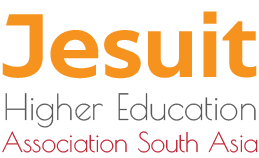REPORT OF JESUIT HIGHER EDUCATION IN SOUTH ASIA: 2018-19.
It was in 2008 Jesuit Conference of South Asia (JCSA) approved the new Secretariat of Jesuit Higher Education in South Asia. Till then it was part of Jesuit Education Association (JEA). A part time secretary was working to coordinate Jesuit Higher Education in South Asia for the past 10 years. The President of South Asia (POSA) has appointed a full-time secretary in January 2018. There are 2 Universities, 42 Arts, Science and Commerce Colleges, 10 Management Institutes, 10 Teacher Training Colleges, 3 Engineering Colleges, 1 Law College, 2 Theology Institutes, 1 Philosophy Institute and 11 Research Centres, affiliated to Jesuit Higher Education in South Asia (JHEASA). Thus, there are 82, member institutions in JHEASA.
48 delegates from South Asia attended the Conference of International Association of Jesuit Universities (IAJU) in Bilbao in July 2018. Subsequently, 68 delegates attended the JHEASA Annual Conference in Dhyana Ashram, Chennai on October 19-20, 2018 to follow up the themes of IAJU Assembly. During the group discussions, some projects were designed based on the 6 themes of IAJU.
Group 1 discussed on Ignatian Leadership and proposed One-week long training for Jesuit vice principals, deans etc., and for student leaders. In the General session, the group secretaries presented the reports on Ignatian leadership programmes for collaborators, students and newly recruits.
Group 2 discussed on Linking ethics and global environment to conduct programmes on Peace and compassion, and community involvement. The areas covered are God Experience on Spiritual Exercises, Jesuit History, Ignatian Leadership and Values.
Group 3 discussed on Civic and Political Leadership formation. This group emphasized the need for involving students and making them active in this area. A few programmes suggested were celebration of constitution week, Training students for administrative work and training in Ignatian leadership.
Group 4 dealt with Education for the Marginalized regarding Admission Policy, Appointment Policy and Financial Policy. They suggested to have admission policy in each province considering local needs, network schools and colleges, accompany the students, conduct special courses and identify and admit bright students among the poor in our institutions.
Group 5 dealt with peace and reconciliation. The group proposed academic and action oriented programmes for inculcating peace and reconciliation. The academic programmes include session on social awareness, diploma course on peace and reconciliation, one credit course on peace and conflict management, research articles on peace and reconciliation, creating a forum to address the issues of dissent and media analysis. The action-oriented programmes include celebration of feasts of all religions, inter-religious dialogue, creating public opinions, inter-cultural and intra cultural festivals.
- JHEASA training for young teachers in May 2019.
- Training for Vice-Principals by St Joseph’s college, Trichy in May 2019.
- Training of student leaders by AICUF National Office, Chennai, in April 2019.
- The next JHEASA conference will be in Kolkata in October 2019.
1.The positive ways Jesuit higher education impacting the local:
The advent of Jesuit Higher Education in South Asia was started by French Jesuit Fathers in 1843 by establishing St Joseph’s College, Trichy. Education has been an important mission of Jesuits from time immemorial. Education is considered to be the most powerful instrument for social transformation. Education helps the students to develop their personality and prepares them to be loyal citizens of the country. It not only imparts knowledge, but also develops skills, attitudes and values to be a creative child of God. Jesuit Higher Education particularly aims at full development of human persons with conscience, competence, compassion and commitment. It is to train men and women for others! True education will occur when students and teachers respond to social realities around them and are able to enter into a proactive relationship with people. Considering the multi-religious and pluri-cultural context of India, Jesuit higher education focusses on a secular and genuinely democratic approach to life and activities.
In the past, seminal research and categorization were done in many of our Jesuit colleges. Fr. Blatter is known for his Herbarium that offered scope for research regarding plants. Fr. Santapau was the one who set up the botanical survey of India. Both contributed to the content and method of local education. Since quality education was offered in few institutions in India, the brand names ‘Xavier’ and ‘Loyola’ took on an added significance. Job or employment offers came easily to students who passed out of Jesuit institutions which maintained high standards in higher education. Since Jesuit higher education institutions began with foreign-trained persons, the quality of education was original and for some time foreign-trained personnel were inducted to keep on developing disciplines studied at the Jesuit higher education level. This offered a standard for similar institutions to be set up by Indians.
Presently, the positive contribution made by Jesuit Higher Education is seen in the courses that equip students in Communications (Media), Psychology (varied and graded programmes for different purposes) and Engineering (different technologies) and Management (Business administration techniques). At the local level, the contribution equips students to get suitable placements and job opportunities. Departments in Jesuit institutions of higher education have link-ups with schools and agencies in the urban and rural areas. From time to time, teams of students are sent to schools and agencies to offer courses in computers and allied skills.
2. Where is Jesuit Higher Education growing in South Asia?
(d) Our higher education institutions are also growing in terms of equity and access. We admit a good number of students from the marginalized sections and provide sufficient scholarships for them. They are also growing in terms of social awareness and reaching out to more and more poor people.
3.What are some of the challenges that these institutions facing?
(d) Fewer and fewer Jesuits opt for the apostolate in higher education since they consider pastoral care—as available in parish settings—more attractive and fulfilling.
4.The Strengths and Weaknesses of Jesuit Higher Education in South Asia:
Strengths:
(5) We provide value education, and emphasize the importance of social issues and the need to practise social justice.
Weaknesses:
(7) More training programmes are needed for teaching and non-teaching staff.
5.The six priority issues of IAJU impacting higher education in South Asia:
A university is an institution that promotes education for persons to do research, pool together knowledge and be a resource centre for activities in a state or country. Such education is meant to benefit individuals who serve society in various ways. Some persons have the requisite charism to offer civic and political leadership in society; others are concerned about discovering means that would educate the marginalized. There are those who want to see economic justice practised by all peoples and there are persons who care passionately about the earth and environment. The university’s interest in fostering inter-religious dialogue and understanding helps to minimise superstition, fundamentalism and fanaticism. Society needs peace and reconciliation to develop and find its unity. Those with leadership qualities could inculcate humanizing values in society and encourage people to share their expertise with others for the good of all.
1). Civic and Political Leadership:
A sense of justice must prevail if rights are to be respected and duties honoured. A university could foster studies like the history of the emergence of human rights, the setting up of towns and cities where persons can enjoy peace and satisfaction, and the pattern of an administration that ensures good order and tranquillity among citizens. Political science offers scope for understanding the dynamics of different patterns of government and state-craft both at the national and international levels. Such studies could equip individuals to chart constructive paths for the state as a whole and for the citizens who relate among themselves. The university is the appropriate locus where this happens.
2). Education of the Marginalized:
It is incumbent on the state to enable every citizen to enjoy fundamental rights which human society recognizes. Enabling the marginalized to enjoy fundamental rights is a vital duty that the state must recognize. And one of the ways in which such enabling happens is through education of the marginalized. The university can conduct surveys to ascertain the real needs of the marginalized, offer opportunity for remedial action and support the marginalized in the quest for human dignity and fellowship.
3). Environmental and Economic Justice:
Justice plays an important part in building human society. Two important foundations for such society are the environment and economics. The former includes society’s obligation to preserve planet earth for the benefit and welfare of generations to come. For human life to be sustainable there must be respect for nature and awareness of renewable and non-renewable sources of energy. This respect and awareness have a direct bearing on those who find themselves marginalized in society. There is a moral obligation on the part of the ‘haves’ to reach out to the ‘have-nots’. Economic justice stems from the fact that the earth and its goods are to be shared by the whole human family. The morality of such sharing is to be determined in terms of social and distributive justice. The university possesses the means and personnel to lay down norms for practicing such morality.
4). Interreligious Dialogue:
If unity is necessary for people to live in peace and harmony, then each religion while preserving its unique genius must learn to live alongside other different religions. This can happen in stages: grudging recognition of another religion, seeing all religions as contributing positively to human society, willingness to learn about other religions, and finally entering into religious dialogue with other religions. Dialogue is understood as knowledge gained through the heart. One can look for a dialogue of life, action, common concerns and faith. Such dialogue supposes an understanding of the other that is fulfilling and leads to religious harmony.
5). Leadership in an Ignatian way of Proceeding:
A leader is primarily one who makes his/her contribution so that others can make theirs. The true leader is one who knows that the way forward should not be the result of his/her sole decision but the effort of all who are going forward. This means that individual freedom must be respected and discernment at the personal level must be the point of departure for options to be made. The leader helps to point out the ways in which God is acting in and through persons, and corporate discernment will be preceded by individual discernment.
6). Peace and Reconciliation:
For any society to flourish, there must be peace experienced by its members. Peace is the condition for bonding persons one to another, for creating an environment where progress can be envisaged, and for successfully challenging evil in its many avatars in society. Reconciliation is then possible, and is necessary since it has to do with forgiveness which is always celebrated in freedom.
Conclusion:
In all these six priority themes of IAJU, Jesuit Higher Education Institutions in South Asia have taken steps to design projects for implementation. Both students and staff are involved in this process and periodic monitoring and evaluation are done with the help of monitoring teams. The best practices are shared among the colleges in South Asia.
(Prepared by Joye James SJ, Secretary, JHEASA)






